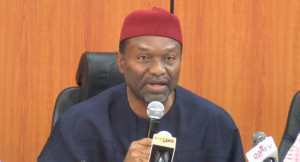
The Federal Government on Thursday said despite the nation’s recent exit from recession, Nigeria’s economy was still vulnerable to shocks.
The Minister of Budget and National Planning, Udo Udoma, said this while addressing a meeting of the National Economic Council presided over by Vice President Yemi Osinbajo at the Presidential Villa, Abuja.
According to highlights of the meeting released by the Senior Special Assistant to the Vice President on Media and Publicity, Laolu Akande, the minister noted that unemployment and underemployment remained challenges to the nation’s economy.
Akande said the minister gave the council a breakdown of sectoral performance of the economy, disclosing that agriculture has the highest Gross Domestic Product growth.
He told the council that inflation has come down to 16.01% in the second quarter from over 18% in the last quarter of 2016.
The statement read in part, “The minister invited the council to note that the NBS has published the GDP for the economy for Q2 2017; that the economy has now recovered from recession growing 0.55% in the second quarter of 2017, with Agriculture growing at 3.01% in Q2 2017, Industry growing for the first time in nine quarters by 1.45%, while Services contracted by -0.85%.
“That the recovery was driven largely by growth in agriculture, manufacturing, crude oil and gas production, solid minerals, financial services, and electricity supply.
“That headline inflation has trended downwards every month since January, though further developments in food prices still need to be watched closely.
“That the economy is sustaining the growth in capital imported into the country with improvement in foreign reserves and trade balance.
“That unemployment and underemployment remain a challenge for the economy.
“That despite these improvements, the economy is still deemed vulnerable to shocks and focused policy implementation is required to sustain the recovery; and the need to continue implementing the ERGP for sustainable development.”